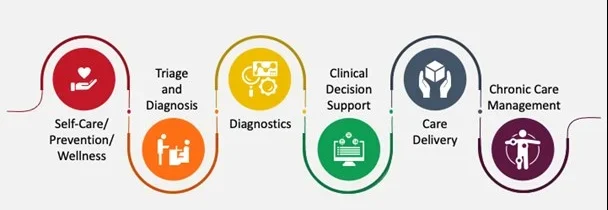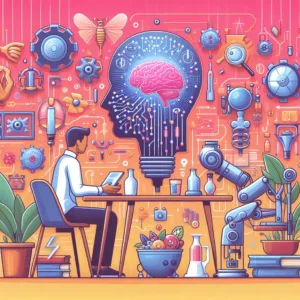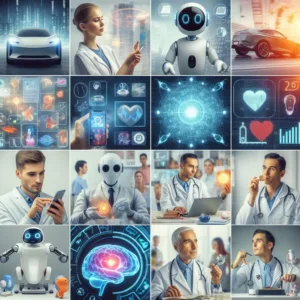Drink to our disquisition of the unborn trends shaping the geography of healthcare analytics. In this blog post, we will claw into the evolving part of artificial intelligence( AI) and its profound impact on healthcare analytics. From prophetic modeling to individualized drugs, AI is revolutionizing how we collect, dissect, and use data in healthcare assiduity. Join us as we uncover the rearmost advancements and bandy the counteraccusations of AI’s elaboration in healthcare analytics.
Leveraging AI for Enhanced Patient Care
In the fleetly evolving geography of healthcare, artificial intelligence( AI) is playing a decreasingly vital part in revolutionizing patient care. With its capability to dissect vast quantities of data, identify patterns, and give practicable perceptivity, AI offers tremendous eventuality for enhancing the quality, effectiveness, and effectiveness of patient care.
AI-driven technologies are being integrated into colorful aspects of healthcare delivery, from opinion and treatment to individualized drug and prophetic analytics. One of the crucial areas where AI is making a significant impact is in perfecting patient issues through more accurate and timely opinions.
By using AI-powered individual tools, healthcare providers can dissect medical images, similar to X-rays, MRIs, and CT reviews, with lesser perfection and effectiveness. These tools can help identify subtle abnormalities that may not be fluently sensible to the mortal eye, enabling earlier discovery of conditions and conditions.
also, AI algorithms can dissect electronic health records( EHRs) and other patient data to identify trends, prognosticate implicit health pitfalls, and recommend individualized treatment plans. This prophetic analytics capability allows healthcare providers to intermediate proactively, offering preventative care and early interventions to cases at threat of developing certain conditions.
Another significant operation of AI in patient care is in perfecting drug operation and adherence. AI-powered systems can dissect patient data, such as medical history, inheritable factors, and life habits, to optimize drug rules and ensure better compliance with specified treatments.
also, AI-driven virtual sidekicks and chatbots are decreasingly being used to enhance patient engagement and support. These virtual companions can give cases with substantiated health information, answer questions, schedule movables, and indeed offer monuments to take specifics or follow up with healthcare providers.
Overall, by using AI technologies, healthcare associations can ameliorate the quality, effectiveness, and availability of patient care. From more accurate diagnostics and substantiated treatment plans to enhanced case engagement and support, AI is transforming the way healthcare is delivered, eventually leading to better issues for cases worldwide.
Transforming Healthcare Data Management with AI
In the moment’s digital age, healthcare associations are submersed with vast quantities of data from colorful sources such as electronic health records( EHRs), medical imaging, wearable bias, and genomic sequencing. Effectively managing and using this data is pivotal for perfecting patient issues, reducing costs, and advancing medical exploration. Artificial Intelligence( AI) is playing a vital part in transubstantiating healthcare data operations by offering important tools and ways to prize precious perceptivity, streamline processes, and drive invention.
AI-powered data operation results are revolutionizing how healthcare data is collected, anatomized, and employed across the continuum of care. These technologies encompass a range of operations, including data integration, data quality assurance, prophetic analytics, and clinical decision support systems. By employing the capabilities of AI, healthcare associations can unleash the full eventuality of their data means and decide practicable intelligence to inform clinical decision- timber and ameliorate patient care.
One of the crucial areas where AI is making a significant impact is in data integration. Healthcare data is frequently siloed across different systems and formats, making it challenging to total and dissect information exhaustively. AI-driven data integration platforms use advanced algorithms to harmonize distant data sources, homogenize data formats, and produce a unified view of patient information. This enables healthcare providers to pierce a holistic view of patient health records in realreal timeading to further informed clinical opinions and substantiated treatment plans.
also, AI-powered data operation results offer sophisticated data quality assurance capabilities to ensure the delicacy, absoluteness, and thickness of healthcare data. Machine literacy algorithms can automatically describe and correct crimes, identify anomalies, and flag data disagreement, helping to maintain data integrity and compliance with nonsupervisory norms similar to HIPAA. By perfecting data quality, healthcare associations can enhance the trustability of clinical perceptivity, alleviate pitfalls, and optimize functional effectiveness.
Prophetic analytics is another area where AI is revolutionizing healthcare data operations. By using machine literacy algorithms and statistical models, prophetic analytics platforms can dissect literal case data to identify patterns, trends, and threat factors associated with colorful conditions and medical conditions. This enables healthcare providers to anticipate and help adverse events, optimize resource allocation, and knitter interventions to individual case requirements. For illustration, prophetic analytics can help identify cases at high threat of readmission or complications, allowing healthcare brigades to intermediate proactively and give targeted interventions to ameliorate issues and reduce costs.
In addition to perfecting clinical decision- timber, AI-driven data operation results also have the eventuality to drive invention and accelerate medical exploration. By using AI algorithms to dissect large-scale healthcare datasets, experimenters can gain new perceptivity into complaint mechanisms, identify new biomarkers, and discover more effective treatments. AI-powered data mining ways can uncover retired correlations and associations within healthcare data, leading to advanced discoveries and advancements in medical wisdom.
Overall, AI is transubstantiating healthcare data operation by enabling associations to unleash the full value of their data means, ameliorate patient care, and drive invention. By employing the power of AI-driven technologies, healthcare providers can streamline data processes, decide practicable perceptivity, and deliver more individualized and effective care to cases. As the healthcare assiduity continues to embrace AI, we can anticipate seeing further advancements in data operation practices, leading to better issues and bettered healthcare delivery for all.
AI-Powered Predictive Analytics in Healthcare
In the realm of healthcare, prophetic analytics empowered by Artificial Intelligence( AI) is revolutionizing the way patient care is delivered and managed. By using advanced algorithms and machine literacy ways, healthcare associations can harness vast quantities of data to prognosticate patient issues, identify implicit pitfalls, and epitomize treatment plans. AI-powered prophetic analytics holds the pledge of perfecting clinical decision- timber, enhancing patient issues, and reducing healthcare costs.
Prophetic analytics involves the use of literal and real-time data to read unborn events or trends. In healthcare, this can include prognosticating complaint progression, relating cases at threat of developing certain conditions, soothsaying sanitarium readmissions, and optimizing resource allocation. By assaying patterns and correlations within large datasets, AI algorithms can uncover retired perceptivity and induce practicable prognostications to guide clinical interventions.
One of the crucial operations of AI-powered prophetic analytics in healthcare is in complaint forestallment and early intervention. By assaying patient data similar to medical history, demographic information, and life factors, AI algorithms can identify individuals who are at high threat of developing habitual conditions such as diabetes, heart complaints, or cancer. Healthcare providers can also intermediate proactively by enforcing preventative measures, offering life variations, or initiating early treatment to alleviate the progression of complaints and ameliorate patient issues.
also, AI-driven prophetic analytics can optimize sanitarium operations and resource application. By vaticinating patient admission rates, bed residency, and exigency department application, healthcare installations can allocate coffers similar to staff, outfits, and inventories to meet patient demand effectively. This can help reduce staying times, ameliorate case inflow, and enhance overall functional effectiveness, leading to better case gests and issues.
In addition to perfecting patient care, AI-powered prophetic analytics is also transubstantiating population health operations. By assaying population-position data from electronic health records, health insurance claims, and public health databases, AI algorithms can identify trends, patterns, and threat factors within specific patient populations. This enables healthcare associations to design targeted interventions, develop preventative health programs, and allocate coffers to address the requirements of vulnerable populations more effectively.
likewise, AI-driven prophetic analytics has the implicit to revise clinical exploration and medicine discovery. By assaying clinical trial data, genomic information, and real-world substantiation, AI algorithms can identify new medicine targets, prognosticate medicine efficacity, and optimize clinical trial design. This accelerates the medicine development process, reduces costs, and increases the liability of successful issues, eventually serving cases by bringing new treatments to request briskly.
Overall, AI-powered prophetic analytics holds an immense pledge for perfecting patient care, enhancing functional effectiveness, and driving invention in healthcare. By using the power of AI algorithms to dissect vast quantities of data, healthcare associations can unleash precious perceptivity, make informed opinions, and deliver more individualized and effective care to cases. As the field of AI continues to evolve, we can anticipate seeing further advancements in prophetic analytics capabilities, leading to better issues and bettered healthcare delivery for all.
Improving Diagnosis and Treatment with AI Algorithms
In the moment’s healthcare geography, the integration of artificial intelligence( AI) algorithms is revolutionizing the way medical judgments are made and treatments are administered. This transformative technology offers unknown openings to enhance patient care, ameliorate delicacy, and streamline processes across the healthcare assiduity.
AI algorithms play a pivotal part in perfecting opinion by assaying vast quantities of patient data with inconceivable speed and perfection. These algorithms can describe patterns, anomalies, and correlations in medical records, imaging reviews, and individual tests that might go unnoticed by mortal healthcare providers. By relating subtle pointers of complaints or implicit complications, AI algorithms enable earlier discovery and intervention, leading to further timely and effective treatments.
likewise, AI algorithms are necessary in bodying treatment plans for individual cases. By assaying a case’s unique medical history, inheritable makeup, life factors, and treatment responses, AI algorithms can induce customized recommendations for specifics, curatives, and interventions. This substantiated approach to treatment maximizes effectiveness while minimizing adverse goods, performing better issues, and better patient satisfaction.
Another significant advantage of AI algorithms in healthcare is their capability to help healthcare providers in making informed opinions. By synthesizing and interpreting complex data sets, AI algorithms can give precious perceptivity and recommendations to clinicians, helping them prioritize tasks, optimize treatment plans, and minimize pitfalls. This cooperative approach between AI and healthcare professionals enhances clinical decision- timber and promotes more effective and effective case care.
also, AI algorithms contribute to the ongoing advancement of medical exploration and invention. By assaying large-scale clinical data sets, relating trends, and prognosticating issues, AI algorithms support the development of new treatments, curatives, and medical technologies. This perceptivity accelerates the pace of medical discovery and greases the restatement of exploration findings into clinical practice, eventually serving cases worldwide.
In conclusion, the integration of AI algorithms is transubstantiating healthcare data operation by revolutionizing opinion and treatment processes. By employing the power of AI, healthcare providers can ameliorate individual delicacy, epitomize treatment plans, enhance clinical decision- timber, and drive medical invention. As AI continues to evolve and expand its capabilities, it’s implicit to revise healthcare delivery and ameliorate patient issues is measureless.
The Impact of AI on Healthcare Operations
Artificial Intelligence( AI) has surfaced as a transformative force in healthcare assiduity, revolutionizing colorful aspects of healthcare operations. From streamlining executive tasks to enhancing patient care delivery, the impact of AI on healthcare operations is profound and far-reaching.
One of the primary areas where AI is making a significant impact on healthcare operations is in automating executive tasks and perfecting functional effectiveness. AI-powered systems can automate repetitious executive processes similar to appointment scheduling, billing, and claims processing, reducing the burden on executive staff and freeing up time for further complex tasks. By streamlining these processes, healthcare associations can ameliorate effectiveness, reduce costs, and enhance the overall quality of care.
also, AI is transubstantiating clinical operations by enabling prophetic analytics and substantiated drugs. AI algorithms can dissect vast quantities of patient data, including electronic health records, medical imaging, and genomic data, to identify patterns and trends that can inform clinical decision- timber. For illustration, AI-powered prophetic analytics can help healthcare providers anticipate patient requirements, identify at-risk populations, and proactively intermediate to help adverse health issues. Similarly, AI-driven individualized drug approaches can conform treatment plans to individual patient characteristics, preferences, and inheritable biographies, perfecting treatment efficacity and case issues.
also, AI is revolutionizing individual processes and medical imaging interpretation. Advanced AI algorithms can dissect medical images similar to X-rays, MRIs, and CT reviews with unknown speed and delicacy, abetting healthcare providers in early complaint discovery and opinion. By aiding radiologists and clinicians in interpreting medical images, AI-powered imaging systems can help reduce individual crimes, ameliorate individual delicacy, and expedite treatment opinions, eventually leading to more patient issues.
likewise, AI-driven virtual health sidekicks and chatbots are transubstantiating case engagement and communication. These intelligent virtual sidekicks can interact with cases in natural language, answer questions, give health education, and indeed help with drug operations. By offering round-the-timepiece support and substantiated guidance, AI-powered virtual health sidekicks can enhance patient satisfaction, ameliorate health knowledge, and promote better tone-operation of habitual conditions.
In conclusion, the impact of AI on healthcare operations is profound and multifaceted. From automating executive tasks to enabling prophetic analytics and substantiated drugs, AI is revolutionizing the way healthcare is delivered and managed. By using AI technologies, healthcare associations can ameliorate functional effectiveness, enhance clinical decision- timber, and eventually deliver better issues for cases. As AI continues to evolve and develop, it’s implicit to transfigure healthcare operations will only continue to grow, steering in a new period of invention and excellence in patient care.
Enhancing Healthcare Efficiency through AI-driven Insights
Fleetly evolving healthcare geography, the effective application of coffers is consummate to delivering high-quality care while managing costs effectively. Artificial Intelligence( AI) has surfaced as an important tool for enhancing healthcare effectiveness by furnishing precious perceptivity and optimizing colorful aspects of healthcare delivery.
One of the primary ways AI enhances healthcare effectiveness is through prophetic analytics and soothsaying. By assaying large volumes of data, including patient demographics, medical history, treatment issues, and functional criteria, AI algorithms can identify patterns and trends that enable healthcare associations to prognosticate patient volumes, resource application, and demand for services. Armed with this perceptivity, healthcare providers can proactively allocate coffers, optimize staffing situations, and streamline workflows to meet patient requirements more effectively and efficiently.
also, AI-driven decision support systems play a pivotal part in perfecting clinical workflows and care collaboration. These systems influence AI algorithms to dissect patient data in real time, furnishing clinicians with practicable perceptivity and recommendations at the point of care. For illustration, AI-powered clinical decision support tools can warn healthcare providers about implicit drug crimes, medicine relations, or diversions from substantiation-grounded guidelines, enabling timely interventions and precluding adverse events. By integrating seamlessly into being electronic health record systems, AI-driven decision support tools enhance clinical decision- timber, reduce crimes, and ameliorate patient safety.
likewise, AI-enabled process robotization helps healthcare associations streamline executive tasks and reduce homemade workloads. AI-powered robotic process robotization( RPA) results can automate repetitious, rule-grounded tasks similar to data entry, claims processing, and billing conciliation, freeing up executive staff to concentrate on further value-added conditioning. By automating routine tasks, AI-driven RPA results enhance functional effectiveness, reduce crimes, and accelerate outturn, eventually leading to cost savings and bettered productivity.
also, AI-driven perceptivity is transubstantiating population health operations and preventative care enterprise. By assaying population-position data and relating high-threat case cohorts, AI algorithms enable healthcare associations to target interventions and coffers more effectively, reducing the prevalence of habitual conditions, precluding sanitarium readmissions, and perfecting overall health issues. also, AI-powered prophetic modeling can read complaint outbreaks, identify environmental threat factors, and inform public health programs, enhancing preparedness and response sweats.
In conclusion, AI-driven perceptivity is revolutionizing healthcare effectiveness by optimizing resource allocation, perfecting clinical decision- timber, streamlining workflows, and enhancing population health operations. By employing the power of AI technologies, healthcare associations can deliver advanced-quality care, reduce costs, and achieve better issues for cases and communities. As AI continues to advance and evolve, it’s implicit to enhance healthcare effectiveness will only continue to grow, driving invention and metamorphosis across the healthcare assiduity.
Harnessing AI for Precision Medicine
Precision drug, a revolutionary approach to healthcare, aims to conform medical treatment and interventions to individual cases grounded on their unique inheritable makeup, terrain, and life factors. In recent times, the integration of Artificial Intelligence( AI) technologies has accelerated the advancement of perfection drugs, offering new openings to ameliorate patient issues and revise healthcare delivery.
AI plays a vital part in the perfection of drugs by assaying vast quantities of patient data, including genomic information, clinical records, imaging studies, and real-time detector data, to identify individualized treatment strategies and prognosticate patient responses to remedy. By using machine literacy algorithms, AI can uncover retired patterns and correlations within complex datasets that traditional styles may overlook, leading to more precise judgments, targeted curatives, and optimized treatment plans.
One of the crucial operations of AI in perfect drugs is genomic analysis and interpretation. AI algorithms can dissect genomic data to identify inheritable variations, mutations, and biomarkers associated with complaint vulnerability, progression, and response to treatment. By integrating genomic data with clinical information and exploration findings, AI-driven genomic analysis platforms enable clinicians to make informed opinions about case care, including opting for applicable curatives, covering complaint progression, and relating implicit treatment resistance.
also, AI-powered clinical decision support systems enhance the perfect drug by synthesizing vast quantities of medical literature, exploration findings, and patient data to give substantiation-grounded recommendations and substantiated treatment guidelines. These systems can help healthcare providers in interpreting complex genomic data, prognosticating complaint threats, and opting for the most effective treatment options acclimatized to each case’s unique characteristics and medical history.
likewise, AI-driven prophetic modeling and threat position tools enable perfect drug enterprises to identify high-threat case populations, prognosticate complaint issues, and apply preventative interventions proactively. By assaying multiple data sources, including genomic, clinical, and environmental factors, AI algorithms can induce substantiated threat scores and stratify cases grounded on their liability of developing specific conditions or passing adverse events. This visionary approach allows healthcare providers to intermediate beforehand, apply targeted interventions, and help complaint progression, eventually perfecting patient issues and reducing healthcare costs.
also, AI facilitates the development of new rectifiers and perfect medicine discovery through virtual webbing, molecular modeling, and medicine repurposing ways. By assaying molecular structures, protein relations, and medicine-target relations, AI algorithms can identify promising medicine campaigners, prognosticate their efficacity and safety biographies, and accelerate the medicine development process. This enables perfect drug enterprises to deliver further effective, substantiated treatments acclimatized to the molecular biographies of individual cases, leading to better treatment issues and reduced adverse goods.
In conclusion, employing AI for the perfect drug holds an immense pledge for transubstantiating healthcare by enabling more individualized, effective, and effective case care. By using AI technologies to dissect complex datasets, identify biomarkers, and prognosticate treatment responses, a perfect drug enterprise can revise opinion, treatment, and preventative care across a wide range of medical conditions. As AI continues to advance and evolve, its integration into perfect drugs will drive invention, ameliorate patient issues, and shape the future of healthcare delivery.
AI Solutions for Healthcare Cost Reduction
healthcare geography, the burgeoning costs associated with medical services, treatments, and executive charges pose significant challenges for healthcare providers, insurers, and cases. still, the integration of Artificial Intelligence( AI) results offers a promising avenue for addressing these cost-related enterprises and optimizing healthcare expenditure across colorful angles of the healthcare ecosystem.
Streamlining executive Processes
AI-powered robotization technologies streamline executive tasks, similar to billing, rendering, claims processing, and appointment scheduling. By automating repetitious and time-consuming processes, healthcare associations can reduce functional costs, minimize crimes, and ameliorate overall effectiveness.
Prophetic Analytics for Resource Allocation
AI- AI-grounded prophetic analytics models dissect vast quantities of healthcare data, including patient demographics, medical history, and treatment issues, to read unborn healthcare application patterns and resource requirements. By relating high-threat case populations, prognosticating complaint outbreaks, and optimizing resource allocation, healthcare providers can proactively allocate coffers where they’re most demanded, reduce gratuitous charges, and ameliorate service delivery.
Preventative care and habitual Disease Management
AI-driven preventative care enterprises concentrate on relating individualities at high threat of developing habitual conditions and enforcing targeted interventions to help complaint progression and reduce healthcare costs. By assaying patient data, covering health pointers, and furnishing individualized health recommendations, AI-powered systems empower cases to borrow healthier cultures, cleave to treatment plans, and avoid expensive hospitalizations and complications associated with habitual conditions.
Optimizing Treatment Pathways and Clinical Opinions
AI-enabled clinical decision support systems help healthcare providers in making substantiation-ground treatment opinions, optimizing treatment pathways, and reducing medical crimes. By assaying patient data, medical literature, and clinical guidelines, AI algorithms give real-time recommendations for opinion, treatment selection, and drug operation, leading to more effective use of coffers, reduced readmission rates, and better patient issues.
Fraud Detection and Revenue Cycle Management
AI-powered algorithms describe anomalies, patterns, and disagreements in healthcare billing, rendering, and claims data to identify cases of fraud, waste, and abuse. By flagging suspicious conditioning and irregularities, AI results help healthcare associations reduce fiscal losses, alleviate compliance pitfalls, and ensure accurate payment. also, AI-driven profit cycle operation tools optimize profit collection processes, reduce claim denials, and accelerate payment cycles, leading to advanced cash inflow and fiscal sustainability.
Addressing Healthcare Challenges with AI-driven Analytics
In recent times, healthcare assiduity has faced multitudinous challenges, ranging from rising costs to hamstrung processes and adding demand for quality care. To attack these challenges effectively, healthcare associations are turning to AI-driven analytics results. These innovative technologies use the power of artificial intelligence to dissect vast quantities of healthcare data and decide practicable perceptivity. In this composition, we’ll explore how AI-driven analytics is addressing crucial healthcare challenges and revolutionizing the way healthcare is delivered.
Cost operation
One of the most burning challenges in healthcare is managing costs while maintaining quality case care. AI-driven analytics helps healthcare providers identify inefficiencies in their operations, similar to gratuitous tests, overstaffing, or force chain issues. By optimizing resource allocation and streamlining workflows, AI enables associations to reduce costs without compromising patient issues.
Clinical Decision Support
Making accurate clinical opinions is consummate in healthcare, yet healthcare professionals are frequently submersed with vast quantities of complex data. AI-driven analytics systems dissect patient data in real-time, furnishing clinicians with timely perceptivity and individualized recommendations to support their decision-making process. This leads to further informed treatment plans, bettered patient issues, and reduced medical crimes.
Prophetic conservation
outfit time-out can disrupt healthcare delivery and concession case care. AI-driven analytics enables prophetic conservation by assaying data from medical bias and relating patterns that indicate implicit failures. By proactively addressing conservation issues, healthcare associations can minimize time-out, extend outfit lifetime, and ensure nonstop service delivery.
Population Health Management
Healthcare providers are decreasingly concentrated on perfecting population health issues and reducing the burden of habitual conditions. AI-driven analytics leverages prophetic modeling and threat position ways to identify high-threat case populations and intermediate proactively. By targeting preventative interventions and care operation programs to those who need them most, healthcare associations can ameliorate health issues and reduce healthcare costs in the long term.
Fraud Detection
Healthcare fraud is a significant concern that results in billions of bones in losses each time. AI-driven analytics detects suspicious patterns in billing data, medical claims, and patient records to flag eventuality fraudulent conditioning. By relating anomalies and unusual patterns, healthcare associations can help fraud before it occurs, guarding both cases and payers from fiscal detriment.
Future Trends: AI’s Evolution in Healthcare Analytics
The future of healthcare analytics is nearly intertwined with the elaboration of artificial intelligence( AI). As AI technologies continue to advance, they’re poised to revise the field of healthcare analytics in several crucial ways. In this composition, we’ll explore some of the most instigative unborn trends shaping AI’s elaboration in healthcare analytics.
Advanced Predictive Modeling
One of the most promising unborn trends in healthcare analytics is the development of advanced prophetic modeling ways powered by AI. These models will be able to assay vast quantities of patient data, including inheritable information, medical history, and life factors, to prognosticate complaint threats, treatment issues, and healthcare resource applications with unknown delicacy. By using AI-driven prophetic analytics, healthcare providers can proactively identify and intermediate health issues before they escalate, leading to bettered patient issues and reduced healthcare costs.
Personalized Medicine
AI-driven analytics is paving the way for individualized drugs, where treatments are acclimatized to individual cases grounded on their unique characteristics and requirements. unborn AI algorithms will dissect patient data to identify biomarkers, inheritable mutations, and other factors that impact complaint vulnerability and treatment response. By furnishing individualized treatment recommendations, healthcare providers can optimize remedial issues, minimize adverse goods, and enhance patient satisfaction.
Real-time Health Monitoring
With the proliferation of wearable bias and Internet of Effects ( IoT) detectors, there’s a cornucopia of real-time health data available for analysis. AI-powered analytics platforms will harness this data to cover cases’ health in real time, enabling early discovery of health issues and timely interventions. From monitoring vital signs to tracking drug adherence and detecting anomalies, AI-driven analytics will revise remote case monitoring and telehealth services, extending the reach of healthcare beyond traditional clinical settings.
resolvable AI
As AI algorithms become increasingly complex and sophisticated, there’s a growing need for translucency and interpretability in healthcare analytics. resolvable AI( XAI) ways aim to make AI-driven opinions accessible and interpretable to healthcare professionals and cases. unborn AI models won’t only give accurate prognostications but also explain the explanation behind their recommendations, empowering clinicians to form informed opinions and make trust in AI-driven healthcare systems.
Ethical and Regulatory Considerations
As AI becomes further integrated into healthcare analytics, there will be a heightened focus on ethical and nonsupervisory considerations girding data sequestration, security, and algorithm bias. Unborn-driven analytics platforms will prioritize patient sequestration and data protection while ensuring compliance with healthcare regulations similar to HIPAA. also, sweats will be made to alleviate algorithmic bias and ensure fairness in healthcare decision- timber, promoting indifferent access to quality care for all cases.
Conclusion
The future of healthcare analytics is at the point of unknown metamorphosis, fueled by the grim elaboration of artificial intelligence( AI). As we embark on this trip towards AI-driven healthcare analytics, it’s clear that the implicit benefits are vast and far-reaching. From advanced prophetic modeling and substantiated drugs to real-time health monitoring and resolvable AI, the possibilities for perfecting patient care and healthcare issues are immense.
still, as we embrace these unborn trends, it’s imperative to do so with caution and awareness. Ethical considerations, data sequestration enterprises, and algorithmic impulses must be precisely addressed to ensure that AI-driven healthcare analytics serve the stylish interests of cases and healthcare providers likewise. translucency, responsibility, and inclusivity should guide the development and deployment of AI technologies in healthcare, ensuring that they profit everyone equitably.
Eventually, the future of healthcare analytics lies in our capability to harness the transformative power of AI while upholding the loftiest norms of ethics, integrity, and case-centered care. By using AI-driven analytics responsibly and immorally, we can unleash new perceptivity, optimize healthcare delivery, and ameliorate the health and well-being of individualities and communities around the world. Together, let us embrace the pledge of AI’s elaboration in healthcare analytics and pave the way for a brighter, healthier future for all.
Healthcare Resources for AI Integration
- Healthcare IT News: Stay updated with the latest news and trends in healthcare IT.
- HIMSS: Explore resources and insights from the Healthcare Information and Management Systems Society.
- Journal of Healthcare Informatics Research: Access scholarly articles and research in the field of healthcare informatics.
- Healthcare Innovation: Discover innovative solutions and best practices in healthcare.
- Healthcare Analytics News: Get the latest updates and analysis on healthcare analytics.
- Healthcare Finance: Stay informed about financial trends and developments in the healthcare industry.
- Healthcare Dive: Dive into insights and analysis on various topics in healthcare.
- Artificial Intelligence in Medicine Journal: Access research articles and studies on artificial intelligence in medicine.
- Healthcare AI: Learn about the applications and advancements of artificial intelligence in healthcare.
- Healthcare Informatics: Explore informative content and resources in healthcare informatics.












![Read more about the article Hamster Kombat Daily Cipher July 2024 [Claim +1,000,000 Coins]](https://aiuptrend.com/wp-content/uploads/2024/07/Hamster-Kombat-daily-cipher-crypto-gaming-HMSTR-coins-game-rewards-14-JULY-300x300.avif)


























